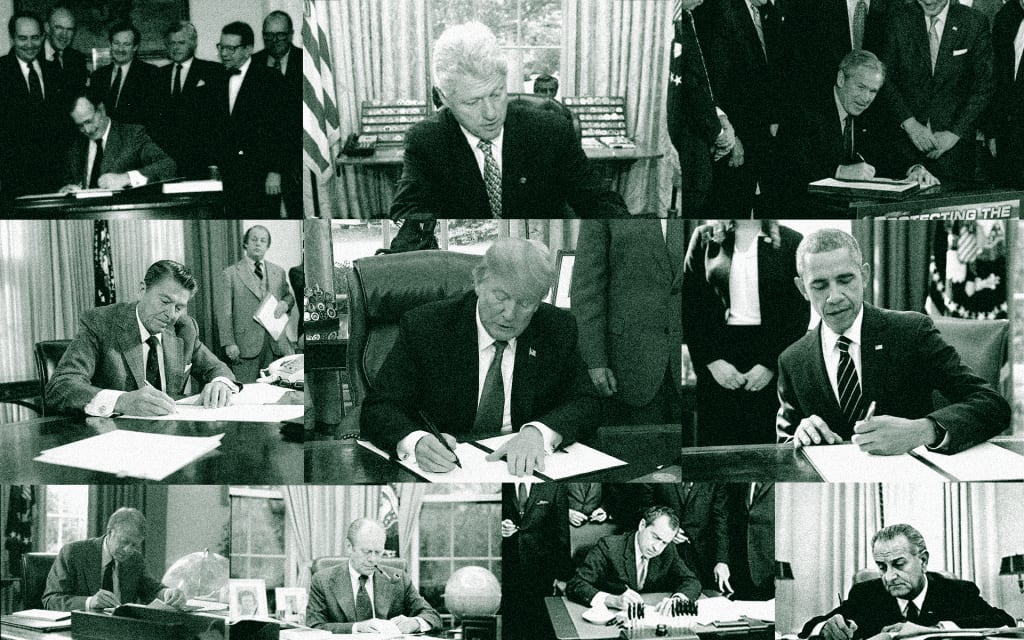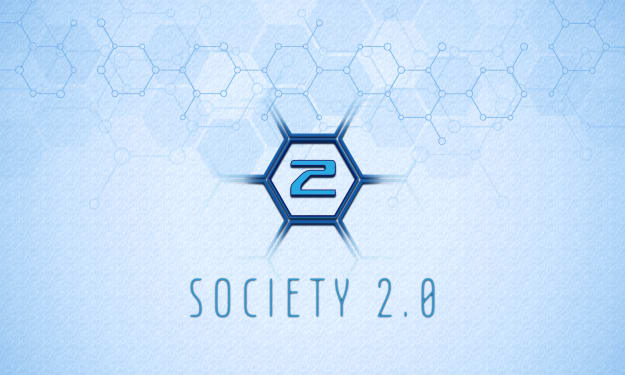Kicking Our Addiction to Executive Orders
Democracy is in danger when we let our elected officials act like kings

The first few days of the Biden Presidency have seen the new president reversing many of Trump's policies and actions over the last 4 years. Many of them were things Trump had no legitimate legal authority to enact. And while it is great these things are being addressed, I find myself asking, "why did we have to wait for a new president before anyone did anything about this?"
Presidents have been abusing the executive order privilege for generations and the Two Party Deadlock (TPD) makes our congress too weak to balance that power. It's time we confront the fact that we won't have a democracy for very much longer if we cannot properly restrain presidential power.
History of Presidential Abuse of Executive Orders
1933 - Uncle Sam wants your gold
In 1933, Franklin D. Roosevelt signed Executive Order 6102 which required US citizens to sell their gold to the US Treasury and made it illegal to own or posses gold coins or bullion (with some exceptions).
When a national leader unilaterally decides you are no longer allowed to own gold does that sound like a republic? Or does that sound like a monarchy?
1942 - Uncle Sam wants your due process
On February 19, 1942, shortly after the attack on Pearl Harbor, Franklin D. Roosevelt signed Executive Order 9066 which directed the arrest and incarceration of approximately 112,000 people of Japanese decent in U.S. concentration camps. Over 70,000 of these people were US citizens, and most of the remainder had been living in the United States for 20-40 years, long before Japan decided to ally with Germany in World War II.
These "evacuees" prisoners were barred access to their bank accounts and relocated to converted livestock stalls until more permanent concentration camps could be built. They lost their homes, livelihood, and many their lives, due to racist war hysteria. There was no due process or any inkling of evidence that they had or would commit any crimes.
When a president can unilaterally decide that you are a potential enemy and authorize your arrested purely because of your ancestry, does that sound like democracy? Or is that something a dictator would do?
1952 - Uncle Sam wants your steel mills
This Executive Order has the distinction of being the only one on this list to be overturned within that President's term, not by Congress as it should have been, but by the steel mill owners themselves having to take the issue to the courts.
On April 8th, 1952 Harry S. Truman signed Executive Order 10340 which directed the Secretary of Commerce to seize control of more than 80 steel mills across the United States.
When a president can unilaterally seize control of your business to support foreign war efforts, does that sound like a free country? Or is that something that only happens in fascist nations?
2001 - Uncle Sam wants your secrets
Shortly after the attack on September 11th in 2001, George W. Bush authorized the President's Surveillance Program which allowed the NSA to conduct surveillance and wire-tapping of US citizens without the need to acquire warrants.
2001 - But Uncle Sam wants to keep his
On November 2001 George W. Bush signed Executive Order 13233 which allowed the President to circumvent congressional law and withhold documents of former presidents in the interest of national security.
Regardless of the potential merits of this order, this is a clear example of a President exempting himself from following the law. The President decided he did not want to follow this law, and so wrote an Executive Order exempting himself, rather than going through the proper channels to amend the law.
This executive order was not fully overturned until President Obama later revoked it with Executive Order 13489.
Should an elected official be able to unilaterally exempt themselves from following the laws that govern their position? Or is that something a king would do?
What Happened to Separation of Powers?

Separation of Powers is the philosophy built into the core of our Constitution that says we cannot give too much power to one person. The Founding Fathers were afraid of a politician, through cult of personality, subverting the system into a dictatorship. That is why we have the 3 branches of government: Legislative, Judicial, and Executive.
The three branches have checks and balances against each other to prevent one person or a small group of people taking total control of national government. But that all falls apart when two of the branches fail to uphold their duty to keep the other branch in check.
That is exactly what has been happening for the last 4 years and much longer. The Legislative and Judicial branches have been failing us.
As we've seen, this problem didn't start 4 years ago. This has been going on for generations.
While Lincoln is recognized as the first President to really stretch the powers of the President, Teddy Roosevelt is considered the father of the Legislative Presidency when he effectively declared his powers were unlimited unless specifically restricted by Congress or the Constitution.
"The most important factor in getting the right spirit in my Administration . . . was my insistence upon the theory that the executive power was limited only by specific restrictions and prohibitions appearing in the Constitution or imposed by the Congress under its Constitutional powers."
Theodore Roosevelt - An Autobiography (1913)
While "Slippery Slope" would normally be called a logical fallacy, here we have a perfect example of the slippery slope. President after President, using the Presidents before them as an example, have continued to push the boundaries of the Presidential power.
Are Executive Orders Even Legal?
It's a very good question. The Constitution of the United States does not specifically grant the President permission to issue Executive Orders. Only through a broad interpretation of Article II have Congress and the Supreme Court turned a blind eye to Presidents taking such actions.
Personal Opinion: I don't believe that it was ever intended for the President to wield the kind of power that we have allowed our Presidents to wield. It goes against the core principle of separation of powers. But that isn't for me to decide. That's something for us as a nation to decide.
What Should We Do?
I strongly believe we should restrict executive orders, or make them easier to overturn. Presidents should carry the burden of proving an order is in alignment with existing law before being enacted, rather than Congress or the Courts having the burden to prove that it isn't.
The Executive branch is not supposed to make laws, they are supposed to enact and enforce the laws created by Congress. If Presidents were sticking to their lane we wouldn't have the situation we see today.
Also we need to dismantle the TPD (Two Party Deadlock) that keeps a stranglehold on US politics. Political parties have no place being official institutions in our government.
Having a strangled Congress that is more interested in fighting over partisan issues than solving real problems is the root of the problem; and overreaching Presidents circumventing Congress is absolutely not the right solution.
A single person should not have the ability to circumvent congress. The whole point of a republic is to prevent exactly that scenario from happening. The drawback is it is harder to enact positive legislation. But the benefit is it provides protection against dictators who would abuse that power.
Sure, you may get benevolent people who use that power for good, but you will also eventually get tyrants who will use the power to destroy. Regardless of whether an executive order is good or not, if it is overreaching, it should be overturned by congress or the courts.
But Congress will never build up enough steam to take action because half will support the Executive Order purely because they are the same political party as the president.
That is how presidential power is allowed to run out of control. Executive Orders are an addiction. A promise of easy progress, at the cost of our democracy. It's time for an intervention. We need to kick the habit before it is too late.






Comments
There are no comments for this story
Be the first to respond and start the conversation.